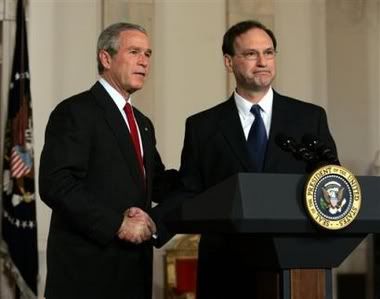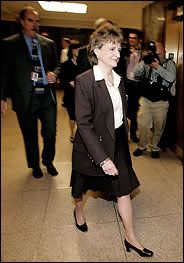Harriet Miers? This can, probably will, and in my humble opinion should be a political disaster for Bush. But what is worse is what it shows of the White House bubble.
David Frum
at NRO:
I worked with Harriet Miers. She's a lovely person: intelligent, honest, capable, loyal, discreet, dedicated ... I could pile on the praise all morning. But there is no reason at all to believe either that she is a legal conservative or--and more importantly--that she has the spine and steel necessary to resist the pressures that constantly bend the American legal system toward the left. This is a chance that may never occur again: a decisive vacancy on the court, a conservative president, a 55-seat Republican majority, a large bench of brilliant and superbly credentialed conservative jurists ... and what has been done with the opportunity?
WSJ Eds: "...Mr. Bush may discover, however, that he'll get a fight anyway, and this time on the less comfortable ground of credentials and "cronyism." Democrat Pat Leahy fired a whiff of grapeshot past the White House on this point yesterday, and you can expect more to come. We've always thought Mr. Bush should welcome an ideological Court fight, both because it would educate the public about the Constitutional issues at stake, and because he ultimately would have prevailed in putting another conservative jurist on the bench. In choosing Ms. Miers, Mr. Bush missed an opportunity for that kind of debate.
He also missed a chance to send a message that taking firm sides in our judicial debates is not politically disqualifying. The President could have selected from numerous qualified men and women--minority and white--who have spent their lives arguing for conservative principles on the bench or off. We're referring to the Michael Luttigs, the J. Harvie Wilkinsons, the Edith Joneses.
Is the President sending a message that these distinguished conservatives are too controversial to be nominated for the High Court, even with a Senate containing 55 Republicans? The lesson this nomination in particular will send to younger lawyers is to keep your opinions to yourself, don't join the Federalist Society, and, heaven forbid, never write an op-ed piece. This isn't healthy in a democracy, and in this sense a Supreme Court fight over legal philosophy that ended in a conservative victory would have demonstrated to the left that Borking no longer works.
Rush: "There was an opportunity here to show strength and confidence, and I don't think this is it. There are plenty of known quantities out there who would be superb for the court. This is a nominee that we don't know anything about, a nominee purposely chosen in one context, we don't know anything about her. It makes her less of a target but it also does not show a position of strength."
...But the main reason I don't like this pick has nothing to do with Harriet Miers because I don't know her. I think the pick makes President Bush look weak. I think the pick is designed to avoid more controversy; the pick is designed to appease. I can't tell you how that disappoints me..."
A lot of us feel that we're in a war with a left wing that is disintegrating, with a left wing that's impaling itself on extremism, a left wing that is taking the Democratic Party so far over the edge that if we just let them go, and force them over the edge on their own, that they'll take that route, and the nomination after genuine, known conservative originalist of that quality would have, perhaps, pushed them over the edge....And defeating the left has been a lifelong objective for many people, and defeating them to the point that they are not rendered absent but obsolete. And to now compromise with them or to appear to compromise with them is what looks weak to me."
NRO's
Rich Lowry:
"Watching Bush strain to pump up her accomplishments was cringe-making. He said she has tried cases “before state and federal courts”! She has “argued appeals that covered a broad range of matters”! She was head of the Texas Lottery Commission and “insisted on a system that was fair and honest”! She was a leader with Child Care Dallas, Meals on Wheels, and other charitable groups! She has a law degree! From Southern Methodist University!
Of course, Miers currently has a heavy-hitting job as White House counsel. That is testament to a certain legal acumen, and she has apparently impressed people with whom she has worked closely. But given the significance of a lifetime appointment to the nation’s highest Court, this is a rather thin qualification. Indeed, the most important reason Miers was picked is that Bush is comfortable with her.
It is only natural that relationships will be important to any political leader. But Bush needs to widen his horizons. Blocked from putting one of his Texas buddies, former White House counsel Alberto Gonzales, on the Court by conservative opposition, he went to another one of his Texas buddies, current White House counsel Miers. Having selected the head of his vice-presidential search team to be his vice president, he now picks the head of his Supreme Court search team to be on the Supreme Court."
NRO's
Jonah Goldberg:
I'm know that I'm not the only one getting a lot of grief from some readers about the view around here that Miers is under-qualified for the job. Many of the emails assert that all one needs are strong reading skills, a logical mind and, and ... well that's about it. This strikes me as an unfortunate line of argument. Again: Miers may turn out to be a great justice. But she's never been a judge, never written seriously on constitutional issues, never been a litigator on such issues etc etc. But if you want to make the case that none of this matters, that's your perogative. All I ask is that you honestly address the question of whether you would have the same reaction if Hillary Clinton nominated her longtime personal lawyer under similar circumstances.
Andrew Sullivan:It seems to me at this stage that Miers might well be a quiet, decent judicial restraint conservative on the court. I'm still open to supporting her nomination. But a more fundamental issue is simply her intellectual and legal caliber. This is SCOTUS. After Roberts, we have gone from a clear A grade to a C +. It seems to me her nomination would be most successfully defeated merely by insisting that the court gets someone qualified in the most basic meaning of the term.
Kathryn Lopez:
Rick Brookhiser: Kathryn, you said "we want to believe." I don't want to believe. I don't care if W ends up on Mt. Rushmore, or a landfill. I want the country to be well-governed, and so do you.
Alexander Hamilton, on the role of Senate confirmation:
"It would be an excellent check upon a spirit of favoritism in the President, and would tend greatly to prevent the appointment of unfit characters from State prejudice, from family connection, from personal attachment, or from a view to popularity. . . . He would be both ashamed and afraid to bring forward, for the most distinguished or lucrative stations, candidates who had no other merit than that of coming from the same State to which he particularly belonged, or of being in some way or other personally allied to him, or of possessing the necessary insignificance and pliancy to render them the obsequious instruments of his pleasure."
RANDY E. BARNETT in
the WSJ:
Apart from nominating his brother or former business partner, it is hard to see how the president could have selected someone who fit Hamilton's description any more closely. Imagine the reaction of Republicans if President Clinton had nominated Deputy White House Counsel Cheryl Mills, who had ably represented him during his impeachment proceedings, to the Supreme Court. How about Bernie Nussbaum?"
"...To be qualified, a Supreme Court justice must have more than credentials; she must have a well-considered "judicial philosophy," by which is meant an internalized view of the Constitution and the role of a justice that will guide her through the constitutional minefield that the Supreme Court must navigate. Nothing in Harriet Miers's professional background called upon her to develop considered views on the extent of congressional powers, the separation of powers, the role of judicial precedent, the importance of states in the federal system, or the need for judges to protect both the enumerated and unenumerated rights retained by the people. It is not enough simply to have private opinions on these complex matters; a prospective justice needs to have wrestled with them in all their complexity before attaining the sort of judgment that decision-making at the Supreme Court level requires, especially in the face of executive or congressional disagreement."
I have to say I agree. I am spectacularly disappointed. I will actively pray for the defeat of this nominee and the subsequent bloody nose for the President for making such a fantastically unqualified choice. I hope for her complete obliteration by the Senate, not due to her or what she is, but to expose the President for his midnight decision in the garden of ignorance and arrogance.




